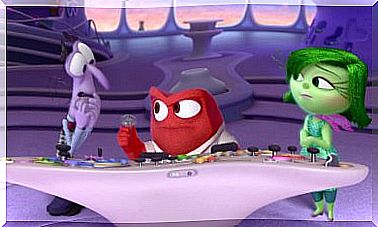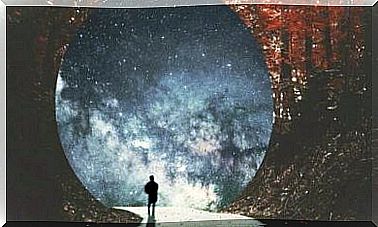Why, According To Jacques Lacan, To Love Is To Give What One Does Not Have?

To love is to give what you don’t have. It is seeing the other as someone unique, new and exceptional who deserves the best from us and not projecting old erroneous patterns from the past onto them. It is loving in an authentic, free and mature way without pretending that this affection leads us to already lived and known forms of love that caused us suffering. To give what we do not have is to embrace the here and now to recognize the other.
Few figures like the French psychoanalyst Jaques Lacan had such skill to construct authentic dialectical juggling when transmitting their theories, statements and knowledge. Despite this, we recognize his importance and unmatched expertise to make us reflect on determining issues such as love.
With the aphorism “to love is to give what one does not have, to whom he is not” he constructs a sentence from a denial to play once more with psychoanalytic slang. What he was basically looking for was to make us think about something. People often build our relationships from lack : the love that we did not have in childhood we seek in adulthood.
The affection that our last partner did not give us, we look for it in the next one. We always embrace love, bringing with us an ideal of what love is. Giving up that ideal will allow us to free ourselves from the past to give to the other what we did not have in their day, that is, authentic affection.

Why is love giving what you don’t have?
The aphorism “to love is to give what one does not have” is nourished by the complexity of the connections that people build. Jacques Lacan spoke about it in his VIII seminar “The transference” when referring to Plato’s Banquet . Thus, something he pointed out is that love is very often conjugated under the figure of a lover wounded by lack, by lack. This causes us to think that what we lack is hidden in the other and that he is also obliged to give it to us.
Sigmund Freud also addressed this question. In his clinical practice, he realized this, how the patient transfers during psychoanalytic therapy many of those deficiencies, of those voids that love has left in his life, especially during childhood. Thus, that transfer, that of “that we are missing something” is something that we project in almost any relationship.
When we bond with other people, we repeat without realizing it, relationships from the past
Something that both Jaques Lacan and Freud himself bequeathed to us is the idea that our unconscious influences us more than we think. It does so to the point of boycotting the way we interact with the world and establish friendship and relationship relationships. Thus, an aspect that we need and seek above anything else is love, it is recognition.
Thus, “to love is to give what one does not have” alludes, according to Lacan, to a very concrete fact embedded in our unconscious: to the lost paradise of our childhood. A part of us dragged the shadow of a yesterday out of tune. That where our parents did not nurture, perhaps, our needs, did not embrace our fears or offer us a secure and enriching attachment.
As we grow we yearn, according to Lacan, to heal that lost paradise (that of childhood). This need causes many of our affective relationships to fail and, as we fail in love, more voids are created, more desires, more unsatisfied anxieties. In each bond, we repeat the same pattern until we make love a frustrating repetition with a taste of unhappiness and misunderstanding.
To love is to give what you do not have, to whom you are not
According to psychoanalysis, there is an inescapable way to achieve satisfaction and maturity in our relationships as a couple. It is through resignation and acceptance. We must renounce being given the love that we did not receive in childhood because that time is already behind us, because the affection of parents is not that of a couple.
We must also give in to that obsession to wait for new loves to offer us the affection that others did not know how to give us. Because those people who hurt us are others and who now occupies our hearts is someone else. Demanding that some repair what others caused us is not logical, mature or advisable.
We must start from scratch and assume what we did not have in the past (love). From that acceptance, we will feel freer to give and receive, to recognize the other without demanding, to put the past aside and embrace the present. To love is to give what one does not have, to whom he is not, because that person is another (different from those who could have hurt us in the past).

Loving here and now leaving behind what is no longer
The suffering of traumatic childhood persists for decades, it is true. The effects of a love that betrayed us or that violated the basic principles of respect and commitment, last over time, it is true. However, nothing is as necessary as opening ourselves to new relationships starting from the present, from the here and now, leaving behind what is not, what no longer exists.
Something like that takes time. To cross that threshold and allow us to build happier bonds, it is necessary to repair self-esteem, accept the past, heal it and strengthen our self-esteem. Only in this way will we build a more enriching future between two.









